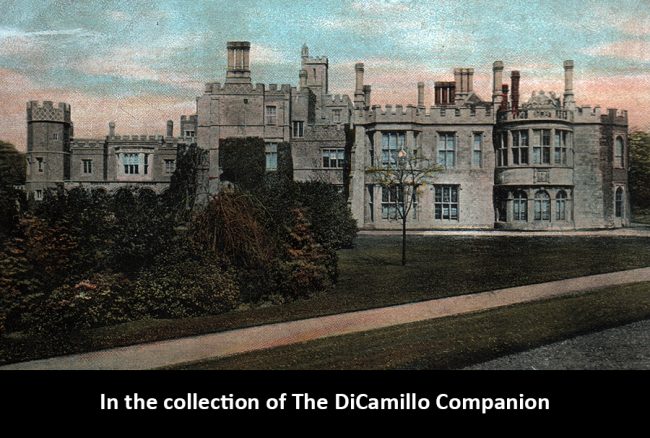
The house from a circa 1899 postcard
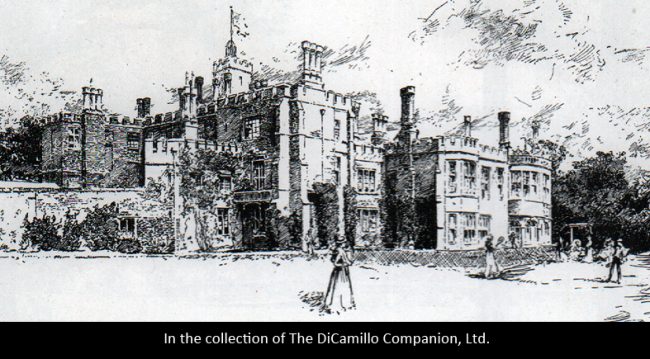
The house from the terrace from "The English Illustrated Magazine," May 1888.
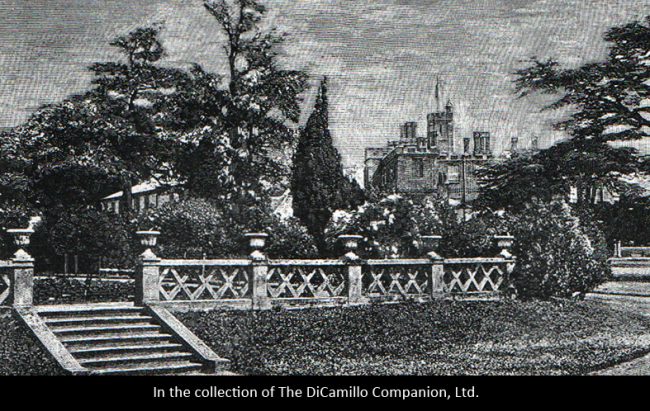
The house from "The English Illustrated Magazine," May 1888.
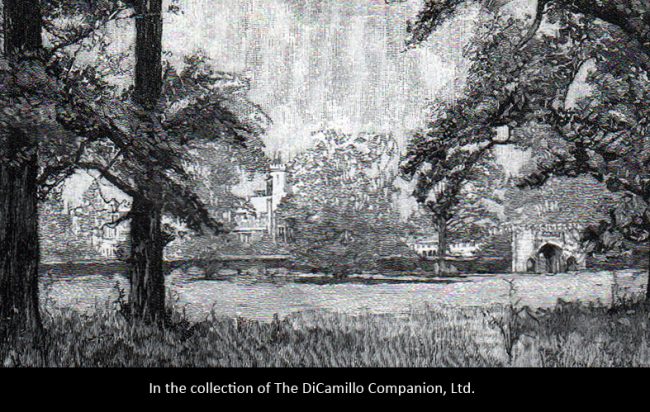
The house from the park from "The English Illustrated Magazine," May 1888.
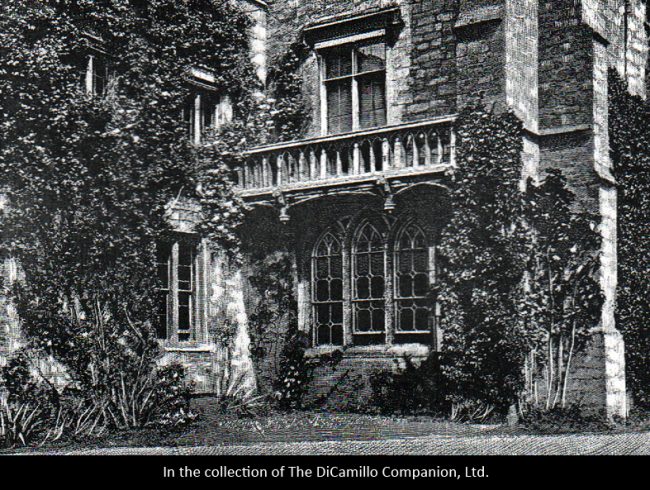
The balcony of Lady Sandwich's Sitting Room from "The English Illustrated Magazine," May 1888.
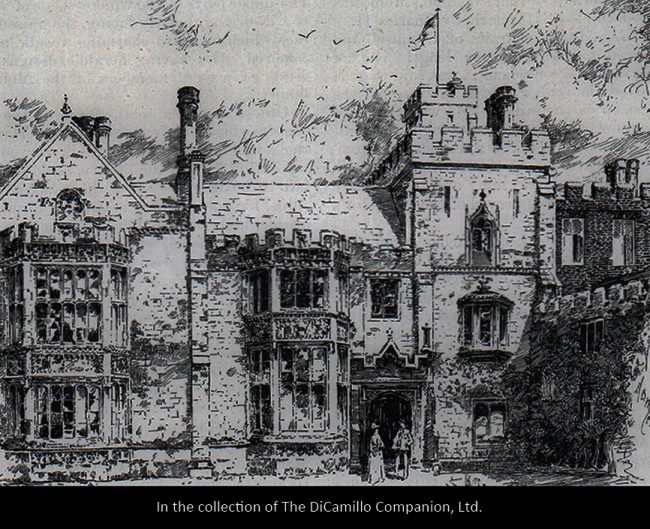
The entrance corner of the Old Nunnery from "The English Illustrated Magazine," May 1888.
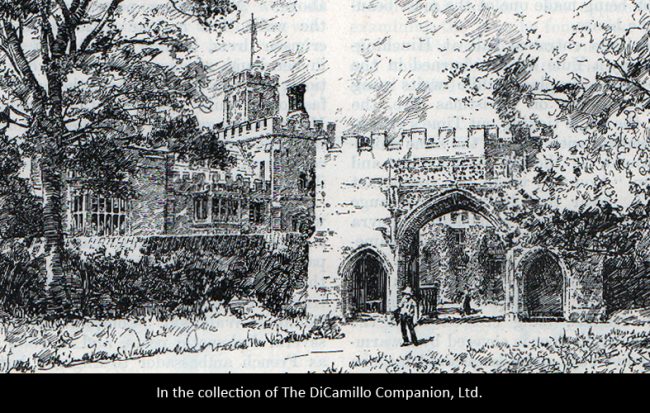
The Old Norman Gateway from "The English Illustrated Magazine," May 1888.
Earlier Houses: There were buildings of an Augustinian nunnery on, or near, the site of the current house. Elements of some of these Medieval buildings were incorporated into the current house.
House & Family History: In March of 1538 Richard Williams (Cromwell), as part of the Dissolution of the Monasteries, purchased the religious buildings of the nunnery of Hinchingbrooke and converted them into a house. Elizabeth I stayed here in August 1564 and James I was a frequent visitor to the house. In June of 1627 Sir Oliver Cromwell sold Hinchingbrooke House to Sir Sidney Montagu, whose descendants remained here until 1962. John Montagu, 4th Earl of Sandwich, was postmaster general in 1768, secretary of state in 1770, and first lord of the admiralty (for the second time) from 1771 until 1782, during which time he presided over the British defeats during the American Revolution. The 1959 edition of the "Encyclopedia Britannica" says of Lord Sandwich: "For corruption and incapacity Sandwich's administration is unique in the history of the British navy." The earl attempted to reform and restructure the rates of pay and working methods for the ship-builders who worked for the Admiralty; this resulted, in 1775, in the most serious strike of the century in England. Troops had to be called in at Woolwich, and Sandwich's reforms were dropped. It has been argued that this strike may have been a serious blow on the effectiveness of the British response to the American Revolution. One of the naval ship-builders' perks that the 4th Earl attempted to eliminate was waste wood, known as "chips," that workers took from the dockyards for their personal use. (These "chips" were often times large pieces of wood that could be used in house-building). It was a common sight in the 18th century to see dockyard workers leaving for lunch, each carrying his ration of wood "chips" on his shoulder. Throughout the 18th century successive governments tried to eliminate this perk, as the Admiralty felt it was an unnecessary expense. From this is the source of the expression "a chip on the shoulder," as representing resentment against authority. Though Lord Sandwich didn't succeed in eliminating the perk of "chips," Samuel Bentham (1757-1831) finally did away with them in 1801. Lord Sandwich was very unpopular and was parodied as Jemmy Twitcher in a line from "The Beggar's Opera." Sandwich was dubbed Jemmy Twitcher because of the fads that characterized his last years at the Admiralty. One of Sandwich's finest achievements was the outfitting and dispatching of Captain Cook on his round-the-world research voyage in 1778. Cook acknowledged his support by naming the Sandwich Islands after him (they later became Hawaii). Lord Sandwich was an industrious worker, often laboring into the night at the Admiralty; he was, however, an inveterate gambler and a member of the Monks of Medmenham, also known as the Hellfire Club. When the 4th Earl was gambling he would sit at the gaming table for hours without meals. According to legend, one day he sent his menservants to get him two slices of bread, meat, and cheese; thus made the sandwich. He did this so he wouldn't get his cards greasy. This story about the birth of the sandwich was refuted by N.A.M. Rodger in his 1994 book "The Insatiable Earl: A Life of John Montagu, Fourth Earl of Sandwich, 1718-1792," a quote from which appears below. "There is no supporting evidence for this piece of gossip, and it does not seem very likely that it has any foundation, especially as it refers to 1765, when Sandwich was a cabinet minister and very busy. There is no doubt, however, that he was the real author of the sandwich, in its original form using salt beef, of which he was very fond. The alternative explanation is that he invented it to sustain himself at his desk, which seems plausible, since we have ample evidence of the long hours he worked from an early start, in an age when dinner was the only substantial meal of the day, and the fashionable hour to dine was four o'clock." (Rodger, pg 79). In March 2004 the 11th Earl of Sandwich personally opened the flagship Earl of Sandwich restaurant at the Disney Marketplace in Lake Buena Visa, Florida, adjacent to Walt Disney World. The business, called Earl of Sandwich, features gourmet sandwiches and is collaboration between the 11th Earl and Robert Earl, one of the founders of Planet Hollywood. The Disney restaurant has a décor that reproduces some of the elements of the earl's home at Mapperton, Dorset (in 1955 Mapperton was purchased by Lord Hinchingbrooke, father of the 11th Earl of Sandwich, and is now the family seat). The business started in 2001 with the delivery of upscale sandwiches (made with fresh ingredients from small British producers) to businesses in London and then expanded, selling to supermarkets throughout Britain. The company was the brainchild of Orlando Montagu, the 11th Earl's second son, who worked for 10 years to bring the restaurant to life, first taking five years to convince his father of the viability of the concept, then three more years to sell Robert Earl on the idea, and finally two years to strike the deal with Disney. The exceptionally fine late 17th century main staircase from Rolls Park was reinstalled at Hinchingbrooke in the 1960s (Rolls Park was demolished in 1951). In 1962 the 10th Earl of Sandwich sold the house and estate to Huntingdonshire County Council, who converted the house into a school.
Collections: The majority of the house's contents were sold in 1962.
Garden & Outbuildings: In 1970, when Hinchingbrooke House was converted into a secondary school, the grounds became the property of the local authority, who use the land for recreational purposes.
Architect: Edward Blore
Date: 1833-36John Bernard (J.B.) Burke, published under the title of A Visitation of the Seats and Arms of the Noblemen and Gentlemen of Great Britain and Ireland, among other titles: Vol. I, p. 109, 1852.
John Preston (J.P.) Neale, published under the title of Views of the Seats of Noblemen and Gentlemen in England, Wales, Scotland, and Ireland, among other titles: Vol. II, 1819.
Country Life: XXII, 630, 1907. LXV, 482 plan, 514, 1929.
Title: Small House in Eighteenth-Century London, The
Author: Guillery, Peter
Year Published: 2004
Reference: pgs. 200-201
Publisher: New Haven: Yale University Press
ISBN: 0300102380
Book Type: Hardback
Title: Walford's County Families of the United Kingdom, 1914
Author: NA
Year Published: 1914
Reference: pg. 1065
Publisher: London: Spottiswoode & Co.
ISBN: NA
Book Type: Hardback
Title: Biographical Dictionary of British Architects, 1600-1840, A - SOFTBACK
Author: Colvin, Howard
Year Published: 1995
Publisher: New Haven: Yale University Press
ISBN: 0300072074
Book Type: Softback
House Listed: Grade I
Park Listed: Not Listed
Past Seat / Home of: Sir Richard Williams (Cromwell), until 1544; Sir Henry Williams (Cromwell), until 1604; Sir Oliver Cromwell, 1604-27. Sir Sidney Montagu, 1627-44; Edward Montagu, 1st Earl of Sandwich, 1644-72; Edward Montagu, 2nd Earl of Sandwich, 1672-89; Edward Montagu, 3rd Earl of Sandwich, 1689-1729; John Montagu, 4th Earl of Sandwich, 1729-92; John Montagu, 5th Earl of Sandwich, 1792-1814; George John Montagu, 6th Earl of Sandwich, 1814-18; John William Montagu, 7th Earl of Sandwich, 1818-84; Edward George Henry Montagu, 8th Earl of Sandwich, 1884-1916; George Charles Montagu, 9th Earl of Sandwich, 1916-62; Alexander Victor Edward Paulet Montagu, 10th Earl of Sandwich, 1962.
Current Ownership Type: School
Primary Current Ownership Use: School
Ownership Details: Since the 1960s Hinchingbrooke School, a local authority school.
House Open to Public: No
Phone: 01480-375-700
Fax: 01480-375-699
Email: [email protected]
Website: https://www.hinchingbrookeschool.net
Historic Houses Member: No